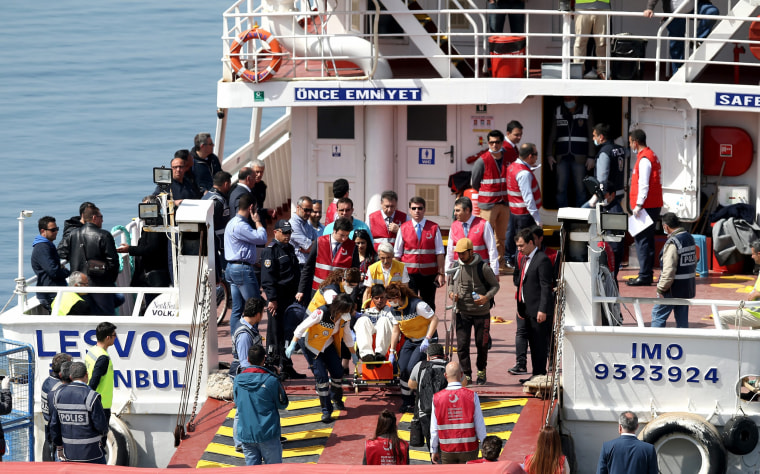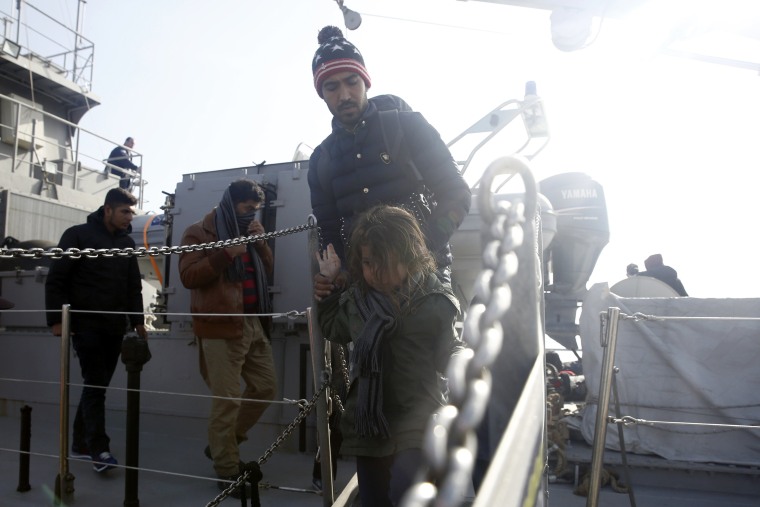Monday marked a turning point in Europe's refugee crisis, with the first group of migrants shipped back to Turkey from Greece as part of a contentious plan shrouded in protests.
Around 130 migrants — mostly from Pakistan and Bangladesh — boarded two ferries at dawn from the Greek island of Lesbos and traveled to the Turkish port of Dikili, according to officials.
Gallery: First Migrants Deported From Greece to Turkey
Another ferry left from the island of Chios and brought the total number of migrants transported to 202, according Frontex, the EU border agency.
It said 180 Frontex officers along with Greek officers were deployed to escort the migrants. Greek riot police squads also boarded the boats before they set sail, The Associated Press reported.

Human Rights Watch's Eva Cosse called Monday a "turning point" that could be a harbinger of a "gross violation of human rights."
"There's no transparency for the procedures," she said from Lesbos, describing how officials have refused to grant international monitors access to the deportations. "We have real concerns that they are hiding things."
Protests surrounded the entire process. A banner reading "RepealTheDeal" was hung across from the harbor in Greece while protesters flew a "Wake Up Europe" banner just inside.
Small vessels of volunteer lifeguards also protested the deportations, hanging signs that read "ferries for safe passage not deportations."
The European Union's deal with Turkey has been condemned as illogical if not illegal by rights groups since its inception. The United Nations has warned the agreement lacks legal safeguards and Amnesty International called it "alarmingly short-sighted and inhumane."
Under the deal, Turkey agreed to take back refugees and migrants that had made it to Europe from its shores. In exchange, the EU agreed to settle thousands of Syrians already in Turkey — one for each Syrian Turkey takes back from the Greek Islands.
The agreement put more than 10,000 refugees and migrants into limbo in Greece — many in a squalid camp along the border with Macedonia, unsure of their fates as European countries moved to seal their borders.
Oxfam said Monday that starting to send migrants back to Turkey moved Europe "yet another step closer" to a policy of indifference.
“Instead of coming together to resolve the crisis, European countries have built fences and shifted a humanitarian crisis away from its door," said Oxfam's Sara Tesorieri in a statement. "People who have been forced to flee conflict, disaster and poverty are being treated in ways contrary to the spirit of international law.”
The ferries' arrival Monday in Turkey was mostly shrouded in secrecy, according to rights organizations and reporters on the scene.
There were protesters there too.
Even as the first migrants were sent back, more were trying to make their way to Europe.
A few hours after the first boat of returnees set sail from Lesbos, Greek coast guard patrol vessels rescued at least two dinghies trying to reach the island, The Associated Press reported.
Melissa Fleming, spokeswoman for the U.N. refugee agency, said there were 58 people rescued.
"We are just going to try our chance. It is for our destiny. We are dead anyway," Firaz, a 31-year-old Syrian Kurd, told the AP.
